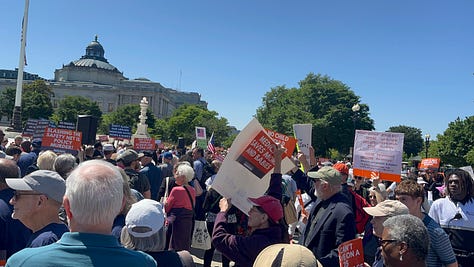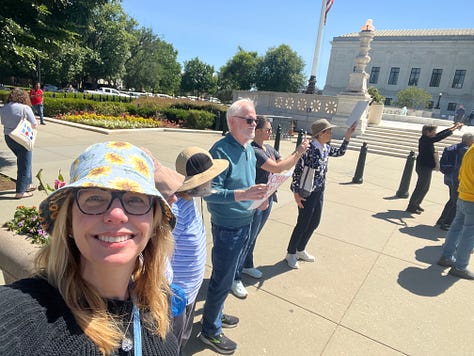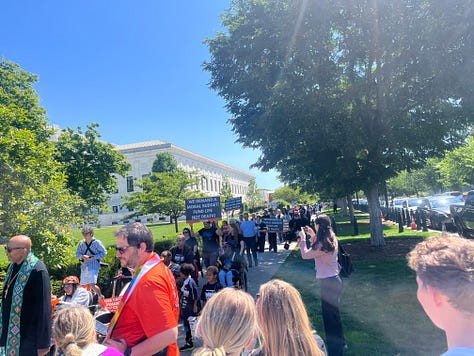A big thanks to Iowa’s esteemed junior Senator for the early peak at the Republicans’ 2028 platform: We’re all going to die, so get right with Jesus.
In case you missed it, she said exactly this, first in response to a constituent’s concerns about the Big Beautiful Bill’s devastating cuts to Medicaid—which will take away healthcare from 13 million Americans, most of them children—then in “apologizing” sort-of-not-really for her earlier statement.
People seem rather aghast, but for those of us who’ve hung around white evangelicalism and observed its longstanding alliance with retrograde politics, it’s not really new. Whether in the voting booth or on the mission field, given a choice, white evangelicals generally prioritize saving souls for eternity over helping bodies in the here and now. Growing up in Africa, I was acutely conscious of this; my parents did give a lot to charity and ministered to many earthly needs, but that seemed to me mostly a means to an evangelism end or a reward for Christian faithfulness. To be fair, there was so much need, I suppose they had to come up with some way of prioritizing their assistance.
Politically, evangelicals’ small government conservatism has been premised on this as well. Private, Christian charity has long been seen as superior to government intervention, and personal faith and repentance is viewed as a good way for a person to “pull themselves up by their bootstraps" and, at scale, for eradicating society’s social ills. The problem is, of course, that this doesn’t really work out, as seen in the lagging social and economic indicators of the most evangelical states. I wrote a whole article about this.
But more broadly, there is an extremely long history, in multiple different faiths and contexts, of people in power dangling the promise of heaven in front of the less fortunate to avoid responsibility and reform and to serve their own interests. Catholic priests selling indulgences comes most immediately to mind, as do terrorist groups recruiting suicide bombers. As well as every single cult leader to ever live.
In American history, you see it most vividly in proslavery Christianity. Slaves were intentionally evangelized using a carefully edited gospel that emphasized the promise of heaven for those who were faithful to their callings on earth (for a slave, that meant a life of obedient servitude). A good Christian slave with his eyes fixed on eternity was far more easily controlled, and Christian masters’ consciences were soothed by the assurance that, through slavery, the souls of otherwise damned people had been saved.
Richard Furman, the head of the South Carolina Baptist Convention and namesake of the Southern Baptist Furman University (they still haven’t changed the name), wrote a popular tract in 1822 defending slavery from a Christian perspective. Among other things, he argued that slavery had improved the lives of slaves “mentally and religiously,” and that if they had been saved from hell, “then may the just master and humane master [side note: those were pretty much fictional characters], who rules and provides for his slaves, according to Christian principles, rest satisfied.” “This is the religious interests of Negroes. For though they are slaves, they are also men . . .having immortal souls,” and destined for a religious reward.
“We’re all gonna die,” a slave master might have told his slaves, or his troubled conscience late at night. “Those who would like to see eternal and everlasting life …[should] embrace my lord and savior Jesus Christ.”
The promise of heaven really was a comfort to slaves amidst horrendous earthly suffering, as the spirituals they sang attest: “Swing low, Sweet chariot, Coming forth to carry me home.” But Black American Christians weren’t content to simply dream of heaven. They built a theology around ending hell on earth, starting with slavery, but moving on to all manner of injustice and harm.
I was reminded of this most powerfully today when I attended another Moral Monday service, led by the Rev. William Barber, a Black pastor from North Carolina who leads Repairers of the Breach. Moral Mondays have expanded to included multiple faith and activist groups, including Indivisible, and is most immediately focused on defeating the immoral, fiscally irresponsible budget bill. Today’s rally was much larger than previous ones and a picture of America itself, as Rev. Barber observed. All races, ages, orientations, faiths. It was a gathering of concern and anxiety, but also one of community and joy, another incredible hallmark of the Black church.



Barber’s response to Joni Ernst showed the contrast between Black and white American Christianity rather starkly.
He rightly points out that Jesus actually didn’t talk about the afterlife that much (when I realized this as an adult, it blew my mind, because the afterlife was pretty much all we talked about). When he did, it was in his highly evocative, allegorical, abstract way that leaves a lot of room for interpretation. Which makes sense; the Jewish tradition from which Jesus came does not articulate a theology of the afterlife at all, and most Jews I’ve encountered these days don’t believe in one.
What is crystal clear is that Jesus was fixated on the poor, the oppressed, the vulnerable, the abused, and was unsparing with regard to their oppressors and abusers, or simply those more fortunate who lacked compassion and mercy.
What’s also crystal clear to me is that none of us—that’s right NONE of us, even you, Little Miss Sunday School—know what happens after we die, if anything at all.
What we can grasp—what God has given us eyes to see, ears to hear, hearts to feel—is that we are surrounded by fellow children of God, with whom we are called into love and service right here and now.
What we are able to understand is that this world has been made better when we seize that calling.
As Rev. Barber said today (paraphrasing), “Asking why some people die and some people live is the wrong question. No one can ever know the answer. Instead ask what can you do for justice with the time you have.”
While people have gone on epic spiritual quests and come up with elaborate theologies and have claimed enlightenment on a hunch and accumulated power based on their best guess—the opportunity to love has been right in front of each of us the entire time. And that when we love each other, it changes the world.
For what ultimate purpose, I can’t say. That’s where faith comes in, for all of us. The belief that it means something. That our love is not in vain. That we are capable of it for a reason.
That’s something the Black church seems to get. Certainly its legacy of uplift and its invitation to join in the joyful, arduous cause of justice is much more powerful and inspiring than what Joni is dishing out, the same Christianity that defended slavery and oppression for decade after decade and at best stood on the sidelines at key moral moments, including our current one.
I will NOT have what she’s having.







What if, just if, the secret to salvation lies entirely in our hands, and Jesus will return only when we do what he has told us to do? No freebies!
Nobody knows where they're going after they die, but if there is a God and that God is anything like love itself, then the question of what did you do for the least of these is the only question to ask. Ernst is willfully cutting off any chance she has for connection and community and maybe even a golden pass through at the Pearly Gates. In her case, I must say I hope hell is: she has to watch those she threw off Medicaid expire needlessly. Over and over. Maybe 14 million times for starters. Where did she get this fictional number of illegals receiving ineligible benefits? Same place as the other tripe Repulsivcans peddle. Way to hit the nail! ~Linda Clare at The Deep End